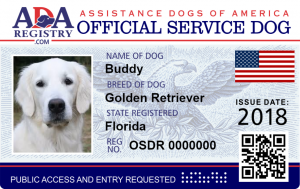
Author: Mark Ainely | Partner GC Realty & Development & Co-Host Straight Up Chicago Investor Podcast
Our Property Management Team recently completed training on the topic of service and assistance animal laws according to Federally regulated Department of Housing and Urban Development (HUD) Guidelines. We wanted to share the outline of information we learned with you so followers, or landlords searching for property management in Chicago or anywhere else, can learn about these important rules and have the opportunity to ask us any additional questions.
These guidelines are directly from HUD and must be followed by all with little grey area to interpret the law. It is important that as a landlord your property management team is informed and understands the laws or, more importantly, understands what they CANNOT do when it comes to service and assistance animals.
GC Realty & Development LLC has seen a substantial increase in recent years in cases of assistance animals, also known as comfort pets or emotional support pets. In fact, since 2001, this has become an important issue for professional property management companies all across the country. This increase provides the opportunity for landlords and property managers to accidentally violate laws that exist to protect tenants.
Take some time to review the following valuable information and at the end are some other resources to find out additional information.
Service Animal
ADA regulations define “service animal” as any dog that is individually trained to do work or perform tasks for the benefit of an individual with a disability
Trained dogs are the only species of animal that may qualify as service animals under the ADA (there is a separate provision for miniature horses).
Assistance Animal, AKA “ESA”
An assistance animal does not need to be trained to perform a service. The emotional and/or physical benefits from the animal living in the home are what qualify the animal as an assistance animal.
Assistance animals are more commonly known as “Emotional Support Animals”
Example:
A cat who can detect and alert their companion of oncoming seizures
A dog who alleviates a person’s depression or anxiety
A bird who alerts their hard-of-hearing companion when someone has come to the door.
What Can I Charge?
Service and assistance animals are not technically pets and owners do not have to pay any pet fees or pet rent. The landlord, however, can charge a security deposit and may still seek money from the tenant if there is any damage caused by the animal to the home.
If there is a nuisance issue, the landlord does have the right to remove the animal through legal proceedings.
How Do I Verify The Animal?
The tenant needs to make a reasonable accommodation request.
A landlord may not deny a reasonable accommodation request because he or she is uncertain whether or not the person seeking the accommodation has a disability or a disability related need for an assistance animal.
You may ask for supporting documentation of a disability if the disability is not apparent. Such as a letter from the tenant’s doctor or therapist stating they have a disability and explaining how their animal is needed to help them cope & improve their symptoms.
A landlord may not ask a tenant or applicant to provide documentation showing the disability or disability-related need for an assistance animal if the disability or disability- related need is readily apparent or already known to the landlord.
Ex) Someone who is blind cannot be asked to provide documentation of their disability need for a guide dog.
Useful Resources:
https://www.hud.gov/program_offices/fair_housing_equal_opp/assistance_animals
https://www.hud.gov/sites/dfiles/FHEO/documents/19ServiceAnimalNoticeFHEO_508.pdf
If you have any questions relating to a specific situation you may be going through regarding this topic, or anything else related to property management, please feel free to reach out to GCR&D anytime.

 Vendor Portal
Vendor Portal

